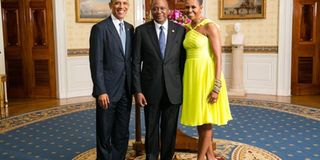Who benefited from US-Africa summit?

President Kenyatta with President Barack Obama and First Lady Michelle at the White House on August 5. PHOTO | WHITE HOUSE
What you need to know:
- Many felt that African Heads of State were summoned to Washington for a photo opportunity with President Obama.
- Critics of the US-Africa Summit may actually imbue America with even greater power than is warranted.
President Kenyatta’s attendance at the US-Africa Summit in Washington early this month — along with 49 other African Heads of State — has been heralded as a great success.
He was seen to have been given a warm welcome by President Obama, two former US presidents, the American business community and the Kenyan Diaspora.
The implication is that his indictment by the International Criminal Court, for crimes against humanity, has not rendered him an international pariah, and that his election in 2013 has had limited consequences.
He was publicly welcomed as the leader of an important country from a region that is of critical importance to America and other global powers.
In addition to this act of political legitimacy, the summit promised tangible benefits for Kenya and sub-Saharan Africa, including increased investment by both the American state and businesses and Kenyans across America, who are the source of more than 50 per cent of remittances into Kenya.
However, at a public discussion on the US-Africa Summit hosted in Nairobi last week by the British Institute in Eastern Africa, it became evident that many Kenyans do not regard Kenyatta’s trip as a success.
Instead, many participants felt that African Heads of State were summoned to Washington for a photo opportunity with President Obama and his wife to further American interests. For some, the real audience for that performance of international relations was China.
The message? America can bring any African Head of State to Washington because it is still the major global power and a country that African states want to do business with.
DIRECT FINANCIAL BENEFITS
In addition, some felt that while the summit might bring some direct financial benefits, positive impacts would be overshadowed by many other negative outcomes.
First, several participants noted how discussions on trade and investment went hand-in-hand with pledges on security and military aid that are likely to further American — but not necessarily Kenyan or African — interests.
For example, it was posited that further investment in the continent’s militaries would further empower these largely unaccountable institutions to influence political processes and terrorise their own citizens.
Second, it was felt that the summit’s focus on aid and foreign investment distracted attention from a reality in which Kenyans should be looking to their own state and tax revenue for many of their development needs and not to external donors.
Moreover, several participants felt that the distraction facilitated corruption and diverted attention from a more important discussion about Kenyan interests and the kind of development that Kenyans want.
The discussion was further nuanced by a question about the possible political consequences of people’s suspicions regarding American interests and the actions of Kenya’s political elite.
The general feeling was that the suspicion is justified and healthy, since critical oversight helps to hold leaders accountable. On this point, I cannot help but agree.
However, there are usually two sides to any issue, and something positive can have negative (if wholly unintended) consequences. More specifically, while suspicion and mistrust may foster critical debate, they can help to further strengthen the powers that they seek to question.
DISTRACT PEOPLE’S ATTENTION
In short, by attributing clear interests, aims and an effective strategy to the American government, critics of the US-Africa Summit may actually imbue America with even greater power than is warranted.
Similarly, discussing the ways in which Kenyatta may have used the meeting to legitimise his presidency and distract people’s attention from corruption and skewed development is to imbue him and his office with great strategic foresight, power, and influence.
In turn, even if this reputation is justified, such assumptions help to maintain a perception and reality that are at odds with the spirit of the Constitution.
In short, focus on the actions and inactions of the Office of the President, even if justified, reinforce a sense that it is the only institution that matters and that control of that office is the only way to shape Kenya’s future.
So, was the US-Africa summit a success for Kenya? That is a much more complicated and contested matter that requires further debate.
However, it was clearly a success for President Kenyatta.
Gabrielle Lynch is an Associate Professor of Comparative Politics at the University of Warwick, UK. ([email protected]; @GabrielleLynch6)





